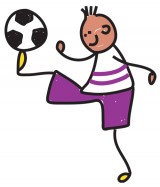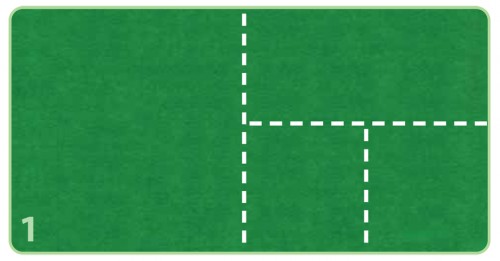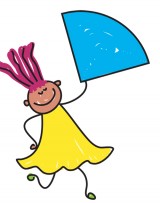Don’t miss the opportunity to squeeze extra learning into your PE lessons, with these tips from Harvey Grout, Gareth Long and Stuart Taylor
 For many teachers, being a subject specialist is hard enough. But as curriculum boundaries become increasingly blurred, have we got
For many teachers, being a subject specialist is hard enough. But as curriculum boundaries become increasingly blurred, have we got
too much to think about? It can certainly feel that way, but with careful consideration about the environment and context in which PE takes place, there’s no shortage of opportunities to move lessons beyond a purely physical experience.
Following on from our differentiation article in the previous edition of Teach Primary, we’re now going to explore activities that focus on incorporating the National Strategies; specifically numeracy and the 6Rs of oral and mental work (see fig. 1). Have a go – it might be easier than you think.
Lesson objective
• To increase children’s confidence in using mathematical vocabulary
• To identify shapes and units of measure through the Six Rs
How to do it
• Select a number of multi-skill or sports activities
• Give three or four pupils the responsibility of being the ‘sheep dogs’
• Assign all other students to areas separated by coned zones that relate to fractions of the whole playing area
• The teacher acts as the ‘farmer’ asking the ‘sheep dogs’ to move the other pupils into specific areas, depending on the fraction expressed
Numeracy focus
Here the teacher can use any type of activity that allows children to develop and refine their generic sports skills. The pupils are encouraged to use the whole space whilst continuing to complete the sports skill (e.g. two pupils with tennis rackets may be rallying a soft ball to each other whilst another pupil might be travelling on parts of their body other than their feet). The teacher then calls out the fraction of the total playing area they are now allowed to complete their chosen skills within. It is then the responsibility of the ‘sheep dogs’ to herd children into the correct zone.
Consolidation tasks
• Have all pupils take part in the same sports skills/activities
• Colour code each of the fraction areas
• Allow a period of time for the ‘sheep dogs’ to think about and discuss which is the correct area
Extension tasks
• Assign different sports activities to be played in specific zones. E.g. children should play football when using the whole area, basketball when using ? of the area, tennis in ? of the area, etc.
• Remove all of the lines apart from the markers around the perimeter.
• Change the shape of the whole area (try circles, triangles etc.).
Figure 1.
| Six Rs |
|
|---|---|
| Rehearse | Practise and consolidate existing skills, usually mental calculation skills |
| Recall | Secure knowledge of facts, usually number facts |
| Refresh | Revisit previous learning; assess, review and strengthen children’s previously acquiredknowledge and skills |
| Refine | Sharpen methods and procedures; explain strategies and solutions; extend ideas and develop and deepen knowledge; reinforce understanding of key concepts |
| Read | Use mathematical vocabulary, interpret images, diagrams and symbols correctly; read number sentences and provide equivalents; describe and explain diagrams and features involving scales, tables or graphs; identify shapes from a list of their properties |
| Reason | Use and apply acquired knowledge, skills and understanding; make informed choices and decisions, predict and hypothesise; use deductive reasoning to eliminate or conclude |

Lesson objectives
• To increase children’s confidence in using mathematical vocabulary
• To rehearse, recall and reason units and calculations
How to do it
• Select a number of individual multi-skill or sports activities
• Place pupils in groups of four, and assign a different activity to each member. Children should carry out their individual tasks in separate quarters of a rectangular playing area. A circular zone in the centre of the pitch should also be marked out as the ‘number pit’ (see fig.2)
• Choose a ‘Buzz’ number (e.g. 2) and tell the pupils
• As the pupils carry out their activities, they should take it in turns to count out loud. One person in the group starts with the phrase: ‘To my left,1…’
• As the next number in the sequence is 2 – the Buzz number – the child to the left should then say “Buzz”. For any number that contains or is a multiple of the Buzz number, children should say “Buzz” in place of the number itself.
• If a pupil gets a number incorrect, the whole team of four must move as quickly as possible to the number pit at the centre of the play area and choose a new Buzz number, before returning to their activity area.
• Each time the group returns from the number pit, they swap their previous activity with another team member’s activity.
Numeracy focus
In their groups of four, pupils are encouraged to try and count to as high a number as possible before a mistake is made, whilst completing their sports skills. When the children reach the number pit, they are encouraged to reason with each other as to which number to select as the Buzz number.
Consolidation tasks
• Have all pupils taking part in simple sports skills/activities
• Use a ‘life’ system where the groups can make errors without returning straight to the number pit
• Only use Buzz numbers with easily calculated multipliers
Extension tasks
• Select sports activities that represent a cognitive challenge
• Make the small groups compete against each other by seeing who can visit the number pit the least amount of times
• Increase the Buzz number difficulty
Figure 2.

• Offer activity that will ensure the development of pupils’ individual physical and cognitive skills. Make sure they feel it is challenging but achievable.
• A game centred activity provides an opportunity for each pupil to be an independent learner and allows the outcome to lead the learning, reinforced by the 6 Rs.
 Harvey is a PGCE PE lecturer at The University of Southampton and Gareth and Stuart lecture on the Coach and Physical Education degree at the University College Plymouth, St Mark and St John. They also publish Sport IQ that provides free PE resources for Key Stage 1 and 2.
Harvey is a PGCE PE lecturer at The University of Southampton and Gareth and Stuart lecture on the Coach and Physical Education degree at the University College Plymouth, St Mark and St John. They also publish Sport IQ that provides free PE resources for Key Stage 1 and 2.
5 friendship and emotions intervention ideas
Ace-Classroom-Support
Easy ways to combat teacher stress
Ace-Heads
Make World Book Day Extra Special This Year
Ace-English
